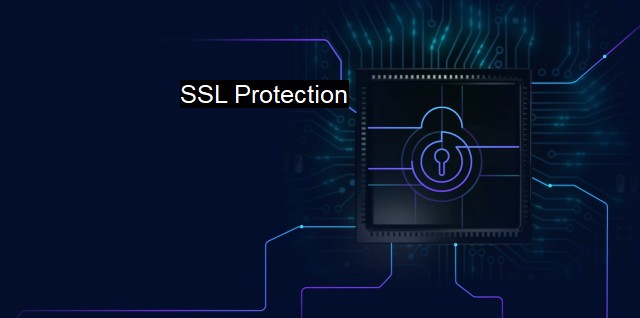What is SSL Protection?
SSL Protection: An Essential Element of Modern Cybersecurity and Antivirus Techniques
Secure Socket Layer (SSL) protection is one of the primary methods of creating a secure environment for online data transmission. It operates under the context of cybersecurity and plays a critical role in the protection of user-relevant information from malicious activities such as hackers and other cybersecurity attacks, establishing a secure pathway for the information to move through.SSL is a security protocol that ensures the safe transmission of sensitive data online. It works by encrypting data in transit, meaning it translates data into an undecipherable format so that unauthorized eyes can't make sense of it. This secure channel ensures that all data transmitted between the web server (where website data is stored) and the client's browser cannot be intercepted and, consequently, misused.
SSL protection is primarily evident when you connect to a website. A typical internet user might recognize it by the locked padlock symbol preceding the website's URL. Clicking on the lock symbol generally signifies that the connection to the server is secure and any information transmitted through the website, such as passwords, payment card details, or personal data, is protected from being intercepted. Besides, a site protected by SSL starts with "https://" rather than just "http://," where the 's' stands for secure.
Another aspect of SSL is the authentication process, which assures that the transfer of data occurs between the right server and client. SSL certificates, totes by website servers, include specific, verifiable information about the certificate owner and the public encryption key. When a browser links to a server equipped with an SSL certificate, an SSL handshake is initiated. If the credentials are verified, a secure connection is established.
SSL's critical role particularly in encrypting information and ensuring authentication, is appreciated even further in different industries. in eCommerce, significant amounts of financial and personal customer data are regularly processed. Here, SSL protection necessitates secure transactions and builds customer trust. In healthcare, sensitive patient data needs protection, with SSL protection acting as essential to maintain patient confidentiality and ensure Healthcare Insurance Portability and Accountability Act compliance.
On the technological edge of things, search engines such as Google consider SSL encryption a website ranking factor—the more secure a site, the better its ranking. This aspect underscores another crucial role of SSL. It not only protects information from point A to point B but also helps establish the credibility of businesses, thereby aiding their market performance.
Despite its apparent robustness, SSL is not immune to attacks. Hackers persistently devise tactics to trick SSL protocols, such as Man-in-the-Middle attacks and SSL stripping, needing constant vigilance and advanced antivirus software fortification. Tools optimized to counter SSL-based attacks are thus a critical part of any robust cybersecurity defense strategy.
In the case of an SSL stripping attack, the hacker forces a downgrade from HTTPS to HTTP, making the website susceptible to data theft. Antivirus software solutions can offer features that counter such attempts, securing web browsing activity for both personal users and enterprises. A well-configured antivirus with web-filtering capabilities can warn users about the insecure HTTP connection, giving them the chance to avoid potentially dangerous sites.
SSL protection is a fundamental bedrock of cybersecurity by presenting encryption, authentication, and trust for the user's online interactions. even the rigorous SSL protocols need backing by equally resilient antivirus software to establish a more well-protected barrier against persistent cyber threats. Through proper understanding and use of both SSL protocols and antivirus software, individuals and businesses can ensure reliable data protection and maintain their digital world's safety and security.

SSL Protection FAQs
What is SSL protection?
SSL (Secure Sockets Layer) protection is a security protocol that encrypts data transmitted between a user's browser and a website's server. It ensures that any sensitive information, such as login credentials, credit card details, and other personal data, remains secure and protected from hackers or cybercriminals.What is the importance of SSL protection?
SSL protection is crucial for ensuring the security and privacy of data transmitted over the internet. It helps to protect against attacks such as man-in-the-middle attacks, where a hacker intercepts and alters data transmitted between two parties. It also helps to establish trust between a user and a website, as the SSL certificate verifies that the website is authentic and secure.How does SSL protection work?
SSL protection works by encrypting data transmitted between a user's browser and a website's server. When a user connects to a website with SSL protection, their browser and the web server will negotiate a secure connection using SSL encryption. This creates a secure channel for transmitting data, ensuring that it is protected from interception or tampering.What are the benefits of using SSL protection?
There are several benefits to using SSL protection, including: - Ensuring the security and privacy of data transmitted over the internet - Protecting against attacks such as man-in-the-middle attacks - Establishing trust between a user and a website - Boosting search engine rankings, as Google considers SSL-secured sites to be more trustworthy - Protecting against phishing scams and other online fraud| | A | | | B | | | C | | | D | | | E | | | F | | | G | | | H | | | I | | | J | | | K | | | L | | | M | |
| | N | | | O | | | P | | | Q | | | R | | | S | | | T | | | U | | | V | | | W | | | X | | | Y | | | Z | |
| | 1 | | | 2 | | | 3 | | | 4 | | | 7 | | | 8 | | |||||||